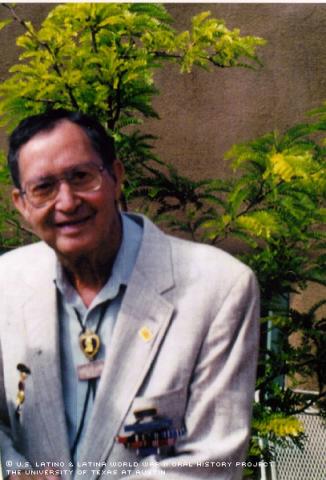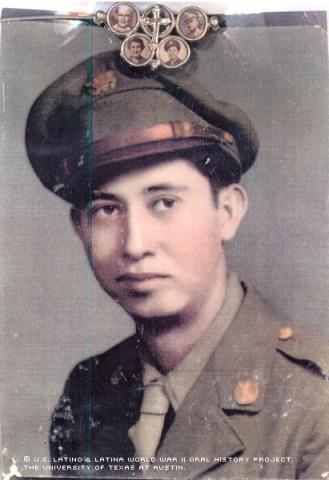

By Alicia Dietrich
When New Mexico native Joseph Rodriguez set sail from New York harbor bound for Europe to fight in World War II, he had no idea where he was headed. He only knew they were traveling east.
"We didn't know nada," said Rodriguez, laughing. "When I got on, I went straight to the back of the ship and saw the Statue of Liberty, and I waved at her."
Once the boat landed in England, they took a first-class train to Southampton, England, to set sail across the English Channel to France. Europe was a far cry from his humble beginnings in Santa Fe, N.M., where he grew up during the Depression. His family had little money, but with their garden and livestock, they never went hungry.
Born May 2, 1926, Rodriguez lived a simple life in his hometown, where he worked odd jobs to make a living. But his routine would end abruptly after the Japanese attack on American troops in Hawaii.
He vividly remembers the day he heard about the bombing of Pearl Harbor on the radio, a day that set into motion the events that would send Rodriguez and all of his brothers to war. He remembers the reaction of his mother, Luisita Griego Rodriguez, who had a feeling her sons would be called up in the wake of Pearl Harbor. As soon as Manuela heard the announcement on the radio, she cried, "¡Hay van mis hijos a la guerra!" ("There go my sons to war!")
Rodriguez’s brothers enlisted, and the Marines were soon knocking on his door to recruit him. His mother begged him not to go so he acquiesced; however, he was soon drafted, getting inducted into service in June of 1944.
Rodriguez was promptly sent to Fort Bliss, Texas, for anti-aircraft training for six months, but was then transferred to Fort Maxey, Texas, for infantry training. From there, Rodriguez was shipped to eastern France on the German border. The infantry was first in line at battle, and he remembers the talk a commander gave them before their first day of engagement.
"He put us in a gymnasium and told us, 'I don't know how much battle experience or training you have, but some of you are not going to come back, some of you are going be wounded, and some of you will come back fine, but you're going to the front lines tomorrow morning,'" Rodriguez recalled. "I will never forget those words."
Rodriguez would serve in Company I of the 30th Infantry, 78th Division, known as the "lightning" division. His duties as an infantryman included manning a bazooka and various front-line duties against the German enemy troops. His division was soon assigned to cross the Rhine River via the Remagen Railroad Bridge, the only span left standing. Crossing the bridge would take his division deep into enemy territory, where Germans stood waiting for them just on the other side.
On March 7, 1945, they received their orders.
"They told us to count to 10 and follow the guy before us into the bridge tunnel," Rodriguez said. "I went in there with my heart in my hands."
Bombs and shells fell all around him, but he managed to make it across uninjured, where he waited for another soldier and others to follow.
"As soon as we crossed, tanks and trucks from all over came in," he recalled.
Rodriguez’s division continued to advance into Germany. On April 10, 1945, he was abruptly awakened by the impact of shrapnel hitting his face. Later that morning, he suffered a flesh wound on the top of his leg, and that afternoon, his foot was almost blown off with a mortar shell. Even though he was wounded three times in the same day, he bears no visible scars and considers himself fortunate to have survived.
"I don't call it luck. I call it blessed. … All the people in Santa Fe were praying, much like we are now," said Rodriguez, referring to the American troops fighting terrorism overseas today.
After lying in the field for hours waiting for treatment, he was given morphine and shuttled to a hospital in Paris, and later to Birmingham General Hospital in Van Nuys, Calif., to heal. From California, he traveled home to see his family in Santa Fe on a 30-day furlough.
He remembers his family's joy at the sight of him. His doctor made travel arrangements for him, and once he arrived in Santa Fe around midnight, he took a cab to his house. Cars were a rare sight on his street, especially at midnight, and he remembers his mother standing in the doorway of their house shielding her eyes from the headlights to see who was in the vehicle. After the initial tears and hugs, she took him in and started cooking to feed him after his long trip.
One year after being wounded in battle, Private First Class Rodriguez was honorably discharged on Feb. 10, 1946. He received several medals and honors for his heroism in battle, including the Presidential Citation for being one of the first soldiers to cross the Rhine River, the Purple Heart for being wounded in action, and the Bronze Star for valor during front-line duty.
Still, medals don't make up for the horror he experienced in battle, he said.
"Someone once said 'War is hell,' which is true," Rodriguez said. "But the thing about war is that it ends. Hell never ends."
Upon Rodriguez’s return from the war, he secured a job as a postal clerk for the U.S. Post Office. He and his wife, Margaret Trujillo Rodriguez, would have eight children together, four boys and four girls. Two of their sons have passed away.
Now living in the town where he grew up, where he attended Our Lady of Guadalupe Catholic School as a boy and later Harrington High School and St. Michael's College, Rodriguez enjoys his retirement in Santa Fe.
He points out how important it is for his story and others like it to be told.
"Freedom isn't free," Rodriguez said. "Every ounce of blood pays for it."
Mr. Rodriguez was interviewed in Santa Fe, New Mexico, on December 11, 2001, by Ron Pacheco.

